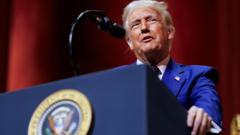In a notable departure from tradition, Sinn Féin has announced its intention to boycott the St. Patrick's Day celebrations at the White House, which could jeopardize long-standing relationships with significant U.S. political figures and the broader Irish-American community. The party's leadership views this decision as a necessary stand against recent controversial remarks by former President Donald Trump regarding Ukraine and Palestine.
Sinn Féin's St. Patrick's Day Boycott: A Bold Political Statement

Sinn Féin's St. Patrick's Day Boycott: A Bold Political Statement
Sinn Féin's decision to forgo the White House St. Patrick's Day celebrations signals a strategic political shift amidst rising tensions in U.S. foreign policy.
This year's boycott comes on the heels of Trump's recent inflammatory comments, including his assertion that Israeli Palestinians could be removed from Gaza and his disparaging remarks about Ukrainian President Volodymyr Zelensky, whom he labeled a "dictator." These comments have drawn international criticism, positioning Sinn Féin's decision as an alignment with public outrage over Trump's statements.
Historically, the first and deputy first ministers of Northern Ireland attend the White House celebrations each year, a tradition rooted in fostering relations with the U.S. However, Sinn Féin's leadership appears to be leveraging the current political climate to make a bold statement, signaling their disapproval of Trump's approach to international issues.
Accompanying Sinn Féin's decision is the presence of eight Irish ministers, including Taoiseach Micheál Martin, who are set to travel to the U.S. next month. While the boycott may resonate with many constituents, it could also alienate some segments of the Irish diaspora known for their support of Trump.
For political opponents, particularly within the Democratic Unionist Party (DUP), Sinn Féin's move may be perceived as a politically calculated decision emanating from Dublin rather than Belfast, igniting potential tensions within Northern Ireland's political framework. Deputy First Minister Emma Little-Pengelly's intention to attend the celebrations is still in play, albeit with potential complications if the first minister vetoes her attendance.
In essence, Sinn Féin's boycott of the White House event appears as a strategic maneuver aimed at asserting their political stance while navigating the complexities of local and international politics—an act that may redefine their positioning within the Northern Irish political landscape as external pressures intensify.
Historically, the first and deputy first ministers of Northern Ireland attend the White House celebrations each year, a tradition rooted in fostering relations with the U.S. However, Sinn Féin's leadership appears to be leveraging the current political climate to make a bold statement, signaling their disapproval of Trump's approach to international issues.
Accompanying Sinn Féin's decision is the presence of eight Irish ministers, including Taoiseach Micheál Martin, who are set to travel to the U.S. next month. While the boycott may resonate with many constituents, it could also alienate some segments of the Irish diaspora known for their support of Trump.
For political opponents, particularly within the Democratic Unionist Party (DUP), Sinn Féin's move may be perceived as a politically calculated decision emanating from Dublin rather than Belfast, igniting potential tensions within Northern Ireland's political framework. Deputy First Minister Emma Little-Pengelly's intention to attend the celebrations is still in play, albeit with potential complications if the first minister vetoes her attendance.
In essence, Sinn Féin's boycott of the White House event appears as a strategic maneuver aimed at asserting their political stance while navigating the complexities of local and international politics—an act that may redefine their positioning within the Northern Irish political landscape as external pressures intensify.



















